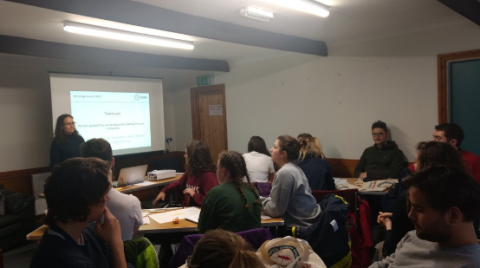In the Wilderness with budding tropical medicine clinicians and practitioners

We recently took part in the Student Wilderness Medicine UK Conference, an annual event hosted this year by the University of Nottingham. This meeting is for students from universities across the UK, mainly medical students.
It included talks to help students find out about planning expeditions, stress and decision making in extreme environments, cave rescue, conducting primary surveys, combat zones, improvising in expedition environments, mass casualty and disaster management as well as making clinical decisions in the wilderness, military medicine and tropical medicine.
Our session was aimed at introducing attendees with an interest in tropical medicine to the RSTMH, telling them about our new strategy and how it may benefit them, and asking them to tell us ways in which they think we should best support the student community.
Small grants and students ambassadors
The students felt that small grants and travel scholarships would be very popular, as there are limited opportunities to access grants so early in careers. They also suggested we establish voluntary representatives at each university and medical school in the UK. These roles would raise awareness of RSTMH meetings, small grants, support and networks. They felt this was a great thing to put on CVs and, in return, we could offer them free event entry or membership.
Many wanted an opportunity like an introduction weekend, at the start of their course, to hear more about RSTMH and help them identify areas of interest early on. These could be in regional centres, providing an opportunity to network, or could be at their universities. Other quick and easy ways to reach the student population included using notice boards or having someone present at weekly rounds in hospitals.
The students wanted us to help them to meet established professionals in their fields of interest – through introductions, social events and shadowing opportunities. This is very much in line with our strategy review findings and plans to consider a mentorship programme.
Mentor programmes for young doctors
Students were also interested in identifying professionals who are seeking students to assist or participate in research studies. They wanted to see more social events and less online events – this is something we trialled last night at the London School of Hygiene & Tropical Medicine, where we hosted a reception for Diploma in Tropical Medicine & Hygiene students. Many attendees wanted to volunteer as ambassadors when they return home at the end of the course and help disseminate information on our meetings and small grants.
We talked about meetings and events and how we could make them more accessible. There was a consensus that podcasts and short snippets of the best speakers from our meetings and events would work well.
The students were interested in the Society providing information and support on carrying out research – choosing topics, applying for initial funding etc. They thought workshops provide a good chance to get stuck into topics and activities – with career workshops being top of the list.
A hub for information on tropical medicine
They saw RSTMH as a hub for finding out which doctors in the UK are working in tropical medicine, as well as past small grant awardees. Competitions were universally accepted as a great way to encourage interest in tropical medicine, with opportunities to present or publish a winning essay or commentary.
It was a great event which gave us the chance to understand how we can help budding tropical medicine clinicians and practitioners develop their careers. We’re now considering these ideas and will announce new activities for this group soon.